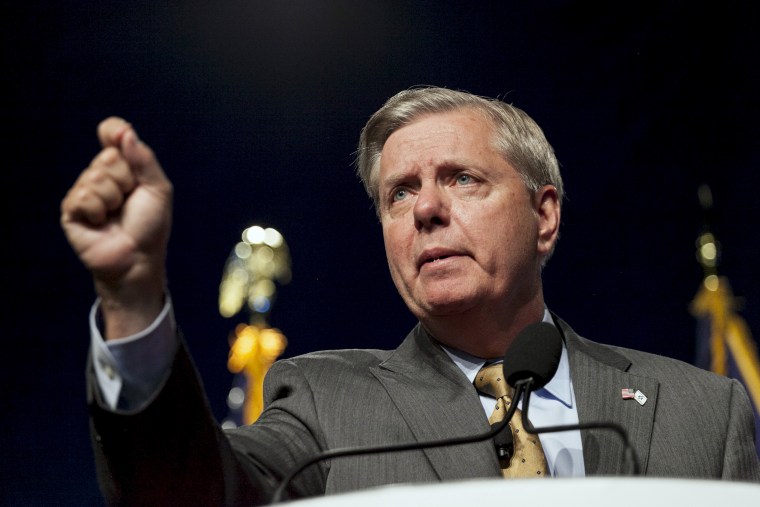Over the weekend, Ronna Romney McDaniel, the chair of the Republican National Committee, proclaimed that the economy is adding more jobs per month under Donald Trump than under Barack Obama. To arrive at this, the RNC chair had to play a misleading game: she counted the early months of the Obama presidency, when the Great Recession -- which began more than a year before Obama took office -- was still causing the economy to hemorrhage jobs.
In other words, McDaniel peddled a line that included a kernel of truth, but which was fundamentally misleading. Sen. Lindsey Graham (R-S.C.). perhaps enjoying his status as a partisan celebrity a bit too much, abandoned the pretense of accuracy altogether yesterday.
"If [Barack Obama's] jobs numbers were anywhere close to what we're talking about with President [Donald Trump], the media would stop the Earth from rotating to make sure everybody heard about it!"
In one unfortunate tweet, Republican senator managed to tie together a falsehood, whining about the media, and shameless Trump flattery. I'm sure the White House was delighted.
But no one else should be. Ahead of the election, Republicans haven't done much to emphasize the economy -- the GOP strategy is based almost entirely on fear -- but when they turn to jobs, they insist that Trump's record trumps Obama's.
That's not even close to being true. Let's dig into the available data.
Trump has been in office for 21 full months. During that time, the U.S. economy, according to Trump's own Department of Labor Statistics, has added 4,054,000 jobs. What's wrong with that? Nothing. It's a perfectly respectable number, reflecting a healthy job market. It's debatable how much credit this White House deserves for the total, but if Republicans want to brag about the figure, that's understandable.
But in the last 21 months of the Obama presidency, the economy added 4,477,000 jobs. The arithmetic is unambiguous: job growth has slowed a bit since Trump took office.
That's not opinion; that's math.
Perhaps, the president and his followers will argue, it's better to look at year-by-year job growth. Fine, let's do that, too. Trump's first year in office was, according to his Labor Department, the worst year for job creation since Obama's first term. Trump's second year in office looks quite a bit better, but with two months remaining, monthly averages in 2018 are behind where we were at this point in 2014 and 2015.
Again, this isn't about political spin. I'm just talking about apples-to-apples comparisons based on arithmetic -- from official data released from the Trump administration.
Yes, lazy partisans can focus on the jobs crisis Obama inherited in 2009, incorporate those early months into some broader averages, and paint a misleading picture, but that's no way to have a meaningful conversation.
It was therefore odd to see Lindsey Graham -- who's been around long enough to know better -- argue that Obama's job numbers aren't even "close" to Trump's.
The questions for the senator and other Trump sycophants remain the same: why was the job market stronger across much of Obama's second term than it is now? Why were the 21 months before Trump's inauguration better for American job growth than the 21 months since Trump's inauguration?
And to borrow Graham's phrasing, why aren't more people stopping the Earth from rotating to make sure everybody hears about it?
